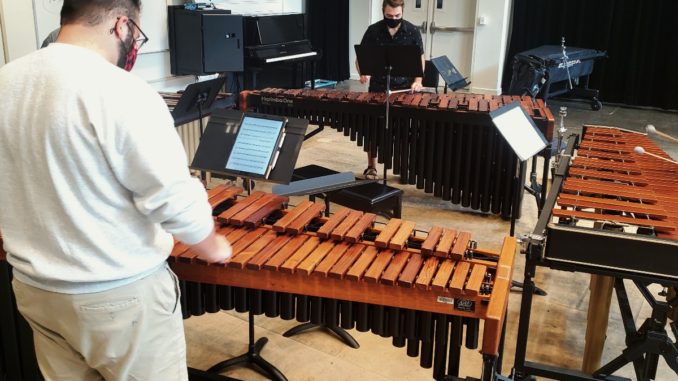
The music department at Truman State University has undergone many changes in response to the COVID-19 virus.
Some of these changes include smaller class sizes, outdoor rehearsals, shorter lesson times, the use of masks and bell covers and more individual practice.
Many of these changes are being made because of research done about how particles are spread through the air. Jazz Studies Director Tim Aubuchon referred to a University of Colorado study which shows that singing and playing wind instruments produces more aerosols than just talking and breathing. With more aerosols in the air, there is a higher chance of coronavirus transmission.
The Truman music department has made its changes in response to this study. One notable change is large outdoor rehearsals for the bands, with social distancing measures in place.
For choral music, outdoor rehearsals are challenging, Choral Activities Director Mark Jennings said. The choirs are addressing this by doing split rehearsals or having the entire rehearsal on Zoom.
“We hold most of the choir rehearsals on Zoom,” Jennings said, “which is a little strange because everyone is singing, but I can’t hear them because they are on mute.”
Students are on mute so that they can still practice, while not causing lagging and other interruptions, Jennings explained.
In order to make lessons safer, assistant music professor Xin Gao has placed a plastic shield in his office to allow for his students to have indoor practice opportunities.
Music professor Jesse Krebs said he has put more materials on Blackboard and has been recording lessons on Zoom.
Tim AuBuchon said he thinks that some aspects of his courses could be more efficient online in the future.
Music lecturer Elaine AuBuchon, said her students are doing a great job of communicating and being positive.
Even with all of the changes that have occurred, the music department is still trying to move forward and adjust with this new normal.
Krebs said there might be a possible outdoor concert.
Jennings said the choral groups will be preparing some recording projects this semester.
“The Music Department is obviously … not the vibrant place it normally is,” Jennings said. “When you can walk by and hear the full symphony orchestra playing in a rehearsal or hear a full choir singing — without those students in class, it’s not quite as exciting for me as a musician. These circumstances do, however, show us how creative we can be to provide meaningful experiences in music for our students.”
